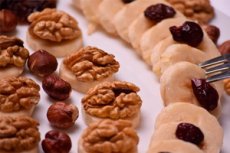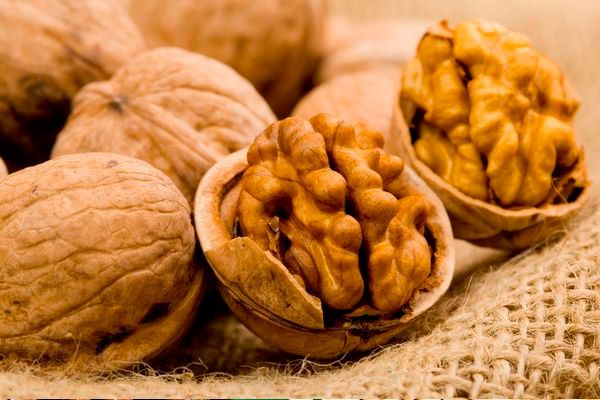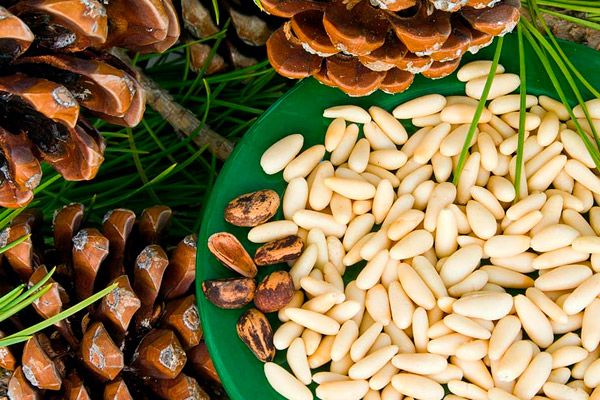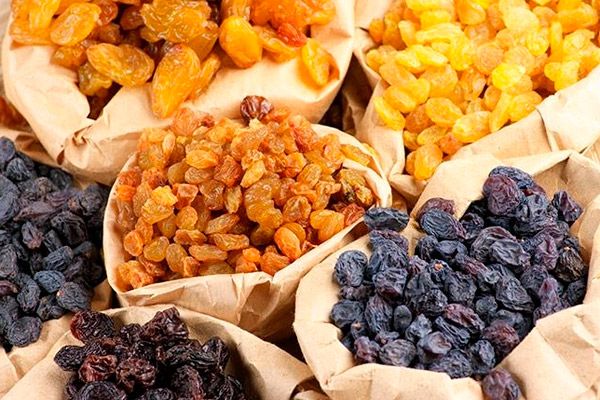
All iLive content is medically reviewed or fact checked to ensure as much factual accuracy as possible.
We have strict sourcing guidelines and only link to reputable media sites, academic research institutions and, whenever possible, medically peer reviewed studies. Note that the numbers in parentheses ([1], [2], etc.) are clickable links to these studies.
If you feel that any of our content is inaccurate, out-of-date, or otherwise questionable, please select it and press Ctrl + Enter.
What nuts can breastfeeding mom: the list
Medical expert of the article
Last reviewed: 04.07.2025

Natural and rich in nutrients, and, in addition, very tasty, nuts can and should of course be included in the diet of breastfeeding women. In terms of their composition, nuts are among the most valuable food products that cause long-term satiety and are convenient for snacking outside the home, for example, on a walk. Therefore, the answer to the question: can a nursing mother eat nuts is definitely positive. But which ones to prefer, we will analyze further.
Vitamins and minerals, proteins, unsaturated fatty acids contained in nuts contribute to a faster restoration of the mother's prenatal health level. And penetrating into breast milk, they provide adequate nutrition and normal development of the child.
Nuts are considered one of the strongest and most dangerous allergens. This should be taken into account when introducing them into the diet of a nursing mother. However, if there is no allergy to any type of nut in the family history, then there is a high probability that everything will be fine with the child. Some types of nuts are considered more dangerous in this regard, however, the body's reactions are very individual, so nuts should be introduced into the diet of a nursing mother little by little - one or two, depending on the size, and the child's condition should be observed. By the end of the week, if everything is fine, the mother can already eat a handful of nuts a day (no more is needed). Even if there are allergy sufferers in the family who cannot tolerate nuts, it is not a fact that the baby has inherited this tendency. In addition, some studies indicate that the mother's consumption of nuts during lactation is a preventative measure against allergic reactions in her child to this product in the future. By the way, this applies not only to nuts.
Walnuts
This type of nuts is also called Voloshskie. It is the most common in our territory. It is eaten raw and dried, and even green. It is green nuts that contain the most vitamin C, and everyone knows about its benefits for the body - no vital process can do without its direct or indirect participation. Ripe nuts do not contain as many vitamins as green ones, but they are quite sufficient.

Vitamin B1 (thiamine) is involved in the metabolism of proteins, fats, and carbohydrates. It is necessary for the normal growth and development of the baby, for the normal functioning of its nervous system, heart and blood vessels, and digestion. It is called the vitamin of optimism, it is involved in the synthesis of blood cells. Vitamins B2 (riboflavin) and B3 (PP, nicotinamide) also participate in hematopoiesis and many other processes that ensure life. Rutin and carotenoids, vitamin E, many mineral components: magnesium, without which all the qualities of vitamin B1 are not fully revealed; iron in combination with B vitamins prevents the development of anemia; zinc, iodine, calcium, phosphorus - a whole vitamin and mineral complex, which in combination with oils, proteins, fiber, fatty acids and a host of other useful substances can prevent the occurrence of any deficiency.
Can a nursing mother eat walnuts? The answer is obvious, but no more than five to seven pieces per day. Daily consumption is also not necessary. Overeating threatens indigestion, allergies and even headaches. People with digestive diseases, hypercoagulation of blood, skin diseases - neurodermatitis, eczema, psoriasis should not eat them. Walnuts are very high in calories, but contain virtually no carbohydrates, so by eating them, a nursing woman does not risk spoiling her figure.
There is an opinion that eating nuts, especially walnuts, increases the quality and quantity of breast milk. In fact, the quantity does not increase, but the nutritional value increases, and the baby does not ask for food again for a little longer.
It is also believed that the skin covering the nut kernel causes allergies. If you remove it, and it is easy to remove from walnuts, then the white contents of the kernel are more inert, although there are fewer useful substances in it.
Nuts do not need to be roasted before consumption, jam made from them, nut paste and confectionery with nuts will not replace nuts. There is practically no benefit in processed nuts, and such products can provoke extra centimeters on the mother's waist and colic in the baby.
But natural walnut oil can be added to salads and porridges. It contains almost all the useful substances that nuts are rich in, and is a good preventative for constipation in both mother and child.
Pine nuts
Edible seeds of coniferous trees (cedar pine), very nutritious and healthy, are considered the most hypoallergenic and safe for nursing mothers. In terms of vitamin and mineral content, as well as nutritional value, cedar seeds are not inferior to, and even surpass, other types of nuts. Its vegetable protein is perfectly absorbed by the human body (99%). 14 amino acids are found in the nut protein, including arginine, which is necessary for normal development and growth.

Can a nursing mother eat pine nuts? Of course, if it is possible to include them in the diet, and they do not cause allergies either to her or to the child. You need to start with a small portion - two or three nuts. The nutrients from the nuts will get into breast milk, and the child will receive them. 30 g of this product contains the daily norm of protein, they will ensure good metabolism of the mother and, accordingly, the child. Cedar pine seeds contain vitamins A, group B (thiamine, raboflavin, nicotinamide) and α-tocopherol, as well as half of the periodic table, lysine, tryptophan and methionine. Their composition provides almost all the needs of the human body in nutritional ingredients.
Peeled nuts must be fresh and kept in a sealed package, if storage conditions are violated, the oils contained in large quantities in the kernels can oxidize. Such nuts are not only useless, but also harmful.
An alternative to nuts that do not grow in our area can be their oil, which retains the main beneficial elements and can be used as a dressing for salads, cereals, and desserts.
Unlike walnuts, pine nuts contain a lot of carbohydrate compounds and their immoderate consumption can cause unwanted weight gain.
Peanut
It is rather a root crop, since it ripens underground and develops from both above-ground and underground basal flowers. It is also called groundnut, although it belongs to the legume family. In terms of nutritional value, peanuts are not inferior to nuts, containing more than 45% fat, more than 25% protein and about 10% carbohydrates. Vitamins A, E, D, with the exception of B6 and B12, a full range of other vitamins of this group, it is especially rich in folic acid (vitamin B9). Contains potassium, iron, magnesium, copper and manganese, antioxidants-polyphenols and other useful substances. This is the most accessible of the products classified as nuts.
Can a nursing mother eat peanuts? This fruit is considered the strongest allergen among nuts. Especially raw, its reddish husk causes allergies most often. If you eat peanuts, then dry them in the oven, peeling off the husk, which comes off easily. There are even more antioxidants-polyphenols in dried peanuts.
Peanuts can be easily replaced with walnuts, which are no less useful. But if neither the mother nor the child has an allergy, then eating a handful of peanuts is not harmful, but even useful. You need to start introducing it into the diet carefully, observing the child's reaction.
It is better to buy peanuts in pods and dry them in them. If you buy already peeled nuts, it is better to dry them yourself. This way they will undergo the necessary heat treatment before use. You should choose nuts that are not moldy, of an even color and do not smell of dampness. Ready-made products can be contaminated with pathogenic microorganisms, peanuts in bags and jars usually contain flavor additives and preservatives. It is not advisable for a nursing mother to eat them.
Peanuts are heavy food, so their consumption should be limited. In addition, they are very high in calories, so they should not be abused. Peanuts are contraindicated for people suffering from gout and arthrosis, caution should be exercised in case of a tendency to thrombosis and excessive obesity.
Peanut butter retains all the beneficial substances of the whole product and can be added to salads and porridge.
Cashew
In terms of composition and caloric content, the Indian nut or cashew is not very different from its counterparts from other trees: approximately the same complex of vitamins, microelements, amino acids. It contains proteins and carbohydrates, is the leader in magnesium content, ahead of many products in iron and potassium content, it has a lot of phosphorus and zinc. It has a lot of choline or vitamin B4, which regulates and normalizes metabolic processes, intestinal activity and transmission of nerve impulses. Eating these nuts will help the mother quickly regain strength after childbirth, strengthen the heart and blood vessels, immunity, and prevent the development of anemia.
Cashew allergies are considered rare, possibly due to the lack of a thin shell on the kernel that usually causes irritation and allergic reactions.
This exotic nut has already become a familiar and favorite product for many. Can a nursing mother eat cashew nuts? Yes, provided the same conditions are met: first try how the child will react; then – do not overeat. A few nuts a day is quite enough.
Indian nuts are also used to make oil, which is even more delicate than peanut oil.
Hazelnut
The cultivated hazelnut and its wild relative are not inferior in nutritional value to other nuts, and even surpass some in caloric content.
The kernels of the nut contain a lot of protein, oil, ascorbic acid and tocopherol, thiamine and riboflavin. Hazelnuts contain biotin, also called vitamin B7, which is necessary for the breakdown of carbohydrates and glucose. Also, interacting with other vitamins of its group, it prevents the development of anemia, promotes the utilization of fats and fatty acids. It leads in manganese content. The combination of calcium and zinc guarantees the strength of bone tissue, magnesium and potassium have a beneficial effect on the cardiovascular and nervous systems. Iron, thiamine and riboflavin are hematopoietic factors, amino acids are extremely important for a growing organism. These nuts are not prohibited for diabetics. Hazelnuts contain almost no carbohydrates, so you can eat them without fear of gaining weight. In addition, it helps remove toxins and slags from the body.
Can a nursing mother eat hazelnuts? If the mother is not allergic to this type of nut, then it is possible and necessary. But with caution, like all new food products. It should be introduced into the mother's diet little by little, observing the child's condition. Even if the mother and child tolerate hazelnuts well, you should not get carried away with this delicacy - the daily norm of nuts should not exceed 30-50g, overeating can cause spasm of the cerebral vessels.
Other nuts, dried fruits and spices
In our climate conditions, when fresh ecologically clean and unprocessed vegetables and fruits are absent for about seven months a year, nuts, seeds, dried fruits and vegetables can be a great help, providing a mother and her baby with all the necessary set of nutrients. They all represent multivitamin-mineral complexes with some small differences in composition and, if stored correctly, retain their properties to one degree or another until the new harvest.
In addition, they contain antioxidants, have antiseptic properties and can help a nursing mother overcome colds and some other health problems (hypertension, nervous disorders, anemia) without the use of drugs, since almost all nuts are used in folk medicine.
Almonds have not been mentioned before. They can also be eaten in moderation by a nursing mother and the recommendations for their use are no different from the previous ones. These nuts contain a lot of calcium, magnesium and pyridoxine (vitamin B6), oil and amino acids. By the way, almonds are also not noticed as a dangerous allergen, hazelnuts and peanuts cause allergies much more often. But they are introduced from the age of three months, after more inert varieties. With the most favorable reactions, a mother can eat no more than ten nuts per day, the weekly dose is 30 pieces. Almonds contain choline and biotin, folic acid and other B vitamins necessary for hematopoiesis and cell renewal. The periodic table is also presented in this nut quite fully. Almond oil is suitable for dressing salads and cereals, sauces and desserts.
Can a nursing mother eat Brazil nuts? This type of nut has appeared on our market relatively recently, and medical statistics have not yet given it their verdict. Therefore, it is recommended to avoid such exotics. The same applies to coconuts. However, they are also not inferior in nutritional value to the fruits we are used to. Therefore, you can also try to carefully include them in your diet, but it will not be difficult to do without exotics.
Another nut that may be of great interest to mothers who are breastfeeding their children is nutmeg. This spice is used in folk medicine as an effective lactation booster. Every housewife has bags and jars of it in her kitchen. So, can a nursing mother eat nutmeg? Despite all its healing properties and effective lactogenic properties, this spice should still be avoided. Because nutmeg is a pronounced psychedelic. The consequences of its use in significant doses can be severe agitation, hallucinations, increased heart rate and heart rhythm disturbances, respiratory failure and even death. The first signs are dry mouth and eye irritation. A child may react to this spice with increased tearfulness and even convulsions. It is contraindicated for pregnant women, nursing mothers and children under three years of age.
An alternative to nuts can be regular seeds, pumpkin and sunflower, which have a huge set of valuable vitamins, mineral components, the same oils and amino acids. Allergic reactions from seeds are rare, although also possible, sunflower seeds are considered more dangerous in this sense than pumpkin seeds.
Sunflower seeds are a powerful antidepressant both in composition and in the psychological effect of their use. They help increase the fat content of milk and increase its quantity.
Seeds are high in calories and can clog the stomach, especially sunflower seeds, so you should eat them without fanaticism. Pumpkin seeds have an antihelminthic effect, but not fried, but simply dried in the air.
It is advisable to dry the seeds yourself, do not eat salted or with other flavorings. It is better to eat them between meals, without mixing with other products, after eating you should brush your teeth.
By consuming seeds, a mother will benefit her nails, bone and muscle tissue, nervous system, hair, skin and immunity, and, accordingly, some of the beneficial properties of this simple product will pass on to her child.
Sesame seeds are a very useful dietary product. They can be added to porridge, grinding a teaspoon in a coffee grinder just before use. Do the same with flax seeds. The porridge will be more useful and very tasty, they can be added at the same time, but you can’t grind them for future use, since flour deprived of its protective shell quickly oxidizes and loses its useful properties, acquiring harmful ones in return.
Dried fruits are also a storehouse of useful substances that saturate the body of the mother and child, improve bowel function and prevent constipation. Any dried fruits can be in the diet of a nursing mother, they can be added to dishes and eaten instead of candy. It is most preferable to start with a small amount of familiar dried fruits - apples, pears, cherries. You should be careful with pears, it is better to add them to dried fruit compote, which is also very useful during lactation and even contributes, according to some data, to an increase in milk production. If there are no direct contraindications, then you can eat a little of everything - dates, dried apricots, raisins, and prunes. Now on sale there are many candied and dried fruits from exotic fruits - pomelo, avocado, kiwi. If there is no serious allergic history in the family, you can gradually introduce exotic fruits into the diet, although if you have local and familiar delicacies, you can do without them.

Still, what nuts and dried fruits can a nursing mother eat? There is practically only one contraindication - allergic reactions. It is impossible to predict them, there are products that cause allergies more often than others, however, it is not a fact that they will cause sensitization in you and your child. It is necessary to be careful, any product from the above is a complex of vitamins and other useful and necessary substances. Especially in the cold season, such a complex will be very useful for a woman who has recently given birth and her baby to restore the pre-natal level of health, as well as the normal development and growth of the child. Nuts, seeds and dried fruits are preferable to synthetic vitamins, which can also cause allergies and have contraindications. Excess food products are easily excreted by the body, while synthesized complexes can cause an overdose effect.
Once again, I would like to remind you of the basic recommendations:
- you should start introducing new foods into your diet with small doses (one or even half of a large fruit or two or three small ones, dried fruits - with compotes) with more familiar types that do not cause allergies in you and your immediate relatives;
- dried fruits and nuts are introduced into the diet when the child reaches two to three months of age;
- When choosing products, give preference to high-quality nuts, without stains or the smell of dampness or mold, in the shell; unprocessed, without salt, preservatives or flavorings;
- carry out heat treatment (drying, scalding with boiling water of raisins, prunes, dried apricots) independently;
- nuts, seeds and dried fruits should be chewed thoroughly to get the maximum benefit and facilitate the process of their digestion and assimilation;
- It is better to eat such products on your own between meals; you can also eat them in the evening, before going to bed, but in very small quantities;
- do not overdo it (seeds, nuts, dried fruits, even those that are already familiar and a priori do not cause allergies - no more than 100g per day)
- Nut oils should be purchased in small quantities, sealed in dark glass containers, since after opening the container they quickly spoil in the air.

